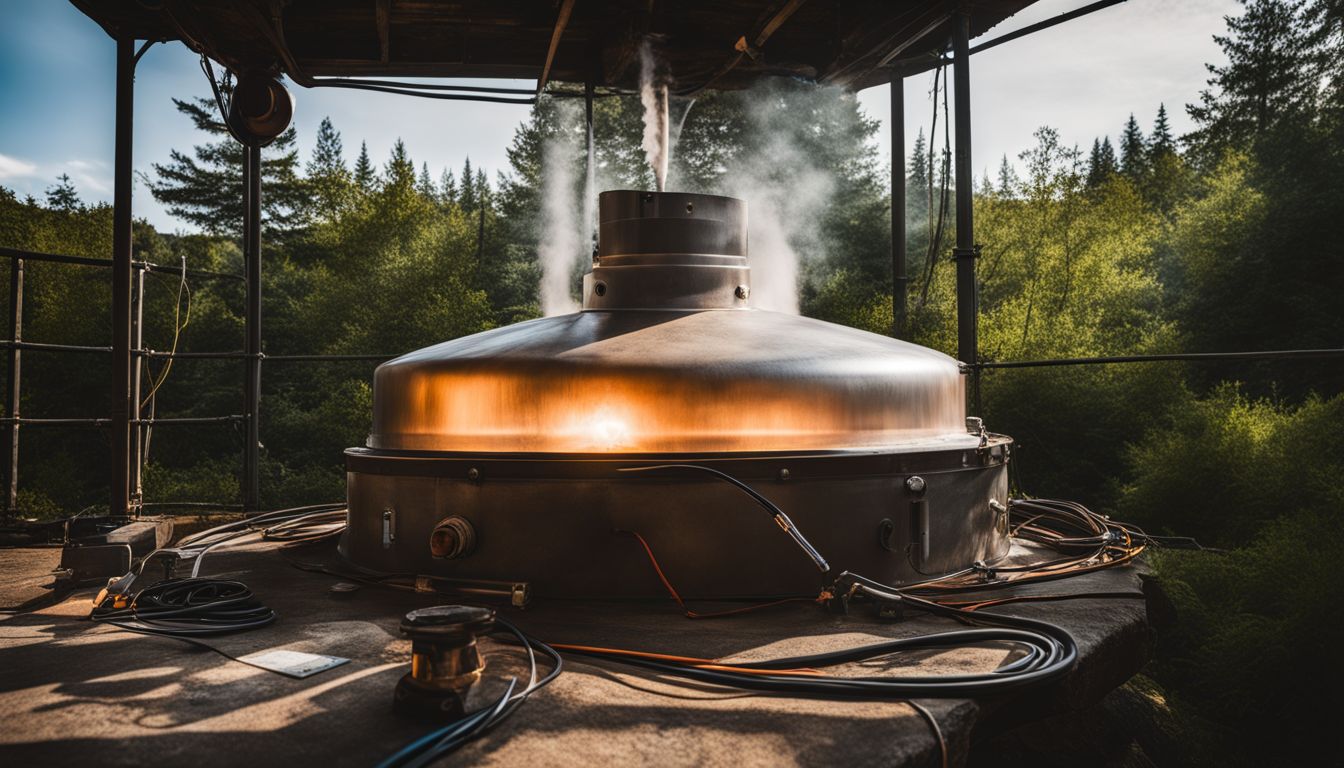Can a geyser run on an inverter?
 Power cuts can leave you cold and frustrated, especially when you're in need of a hot shower. You might be surprised to learn that an inverter could keep your geyser running smoothly during these outages.
Power cuts can leave you cold and frustrated, especially when you're in need of a hot shower. You might be surprised to learn that an inverter could keep your geyser running smoothly during these outages.
Our blog post will guide you through the ins-and-outs of connecting your geyser to an alternative power source. Stay warm with our helpful tips—let's dive right in!
Key Takeaways
- A geyser needs a lot of power, so if you want to use an inverter, it must be strong enough. For example, a 5kVA inverter might work for standard home geysers.
- Using solar panels with your geyser can cut down on electricity costs and help the environment. A 5kW solar system costs around R72,000 in South Africa.
- Smart geysers are new and can save up to 30% of energy. You can control them from your phone and even connect them to batteries or solar panels for hot water during power cuts.
Understanding the Functionality of a Geyser

A geyser heats water for your home. Inside, there's a big tank where cold water goes. An element, like the one in a kettle, warms the water up. This element runs on the electricity that your house provides.
Geysers also have thermostats to control how hot the water gets.
To make sure you don't burn yourself or waste energy, geysers are set at safe temperatures. Often, they're around 60 degrees Celsius—you can change this if needed. The thermostat turns off the element once the right temperature is reached and turns it back on when the water cools down again.
This way, hot water is ready whenever you need it.
https://www.youtube.com/watch?v=s2tmtsfJrBA
Can a geyser operate on an inverter?

A geyser can operate on an inverter, but it depends on the power requirements of the geyser and the characteristics of the inverter. We will explore these factors in detail to understand how a geyser can be powered by an inverter.
https://www.youtube.com/watch?v=yBaVw30mOuw
Power Requirements for a Geyser
Understanding the power necessities for operating a geyser on an inverter is crucial, given that geysers are some of the largest consumers of electricity in a household. Here, we examine the typical electrical demands of a geyser and how these compare to the capabilities of an inverter.
| Aspect | Details |
|---|---|
| Typical Geyser Power Consumption | 3kW to 4.5kW for a standard residential unit |
| Inverter Capability | Must match or exceed the geyser's power requirements; a 5kVA inverter may be used for comparison |
| Daily Energy Usage | 15kWh to 20kWh on average with an inverter setup; 5kWh is considered low usage for a geyser |
| Inverter Size for Geyser | A 5kVA inverter often questioned for its adequacy; larger inverters may be required for higher-capacity geysers |
| Solar Panel Assistance | 4 x 250kW panels connected to a 3kW smart-hybrid inverter should suffice for a geyser's energy demands |
When contemplating the shift to inverter-based power for a geyser, owners must assess not only the inverter’s capacity but also the intensity of their geyser's energy consumption. This table outlines a concise comparison to help in understanding whether an inverter can handle such a high-load appliance. Notably, the advancement of smart-hybrid inverters and the assistance of solar panels can effectively bridge the gap between energy demand and sustainable power supply.
Inverter Characteristics
Inverters play a crucial role in determining whether a geyser can be powered by backup electricity sources. They convert stored DC power into AC power, which is what geysers and most household appliances require. However, geysers are high-power devices, and most home inverters aren't designed to handle such intense loads. To ensure clarity, the characteristics of inverters are summarised in the table below:
| Characteristic | Description |
|---|---|
| Capacity | The amount of power the inverter can provide is typically measured in VA (Volt-Ampere) or Watts. |
| Output Waveform | The type of current produced, such as a pure sine wave or a modified sine wave, affects the efficiency and suitability of various appliances. |
| Efficiency | Ratio of power output to power input, representing how much energy is lost during the conversion process. |
| Battery Voltage | Indicates the required battery voltage compatible with the inverter for optimal performance. |
| Surge Capability | Ability to handle a higher load than its rated capacity for a short duration is crucial for appliances with startup surges like geysers. |
| Protection Features | Safeguards within the inverter, like overload protection, short-circuit protection, and over-temperature cut-off,. |
| Input Voltage Range | The range of input AC voltage over which the inverter can operate effectively. |
| Charging Method | The method by which the inverter charges its batteries can affect charging speed and battery life. |
These specifications must be carefully considered before attempting to connect a geyser to an inverter. Home battery inverters often exclude geysers for the very reason that they draw a significant amount of power—something to keep in mind when planning a backup power strategy for your home's heating needs.
The Role of Solar Panels in Powering a Geyser
Solar panels can play a crucial role in powering a geyser, utilising renewable solar energy to heat water efficiently. By harnessing the power of the sun, homeowners can reduce their reliance on traditional grid electricity and save on energy costs.
https://www.youtube.com/watch?v=iyGmFWMQHHs
How Much Does a 5kW Solar System Cost in South Africa?
Delving into the realm of renewable energy, particularly solar power, it's essential to understand the financial aspect of harnessing the sun's energy. The price tag for a 5kW solar system in South Africa is a subject of interest for many looking to reduce their carbon footprint and electricity bills.
| Cost Component | Estimated Price Range |
|---|---|
| 5kW Solar Panel System | R72,000 |
| Overall Installation | R63,000 - R200,000 |
| Base Cost for Solar Power Kit Installation | Variable |
Remember, these figures represent estimates and may fluctuate based on factors such as location, specific technology or equipment chosen, and the scale of the installation. Additionally, individual needs and the installer's expertise play a crucial role in the final cost.
Smart Geysers: A New Innovation
Smart geysers are a new innovation that offers energy-saving benefits and allows for more precise control over water heating. With the use of smart technology, these geysers can be remotely controlled and optimised for maximum efficiency.
Benefits of Smart Geysers
Smart geysers are changing the way we heat water in our homes. They use clever technology to save energy and money.
- Cut down on power use: With a smart geyser, you can save up to 30% of the energy you would normally use. This means lower electricity bills.
- Control from your phone: You can turn your smart geyser on or off with an app on your phone, even when you're not at home.
- Only heat what you need. Set the temperature and amount of water to be heated, so no extra energy is wasted.
- Get hot water even during power cuts: If you connect a battery backup or solar panels, your smart geyser will still work when there's no power.
- Keep track of how much energy you use: The app shows you how much energy your geyser uses, helping you understand and manage costs better.
- Save more money over time: the EASIWise Smart Solar Geyser Inverter helps you save an additional 60% on hot water expenses.
- Take care of the planet: By using less power, smart geysers help reduce harmful emissions that come from making electricity through burning coal or gas.
- Stay safe against leaks: These systems can detect leaks, which helps prevent damage to your home and saves water too.
- Fast payback for your investment: Although they might cost more upfront, the savings on your bills mean that it won't take long to get that money back.
Conclusion
In short, yes, a geyser can run on an inverter. This could be handy during power cuts. Remember, the inverter must be powerful enough to handle the geyser's energy needs. Solar panels might also help if you're looking at energy savings.
New technology like smart geysers makes using inverters with geysers even better for saving power and money.
For a detailed analysis of solar system expenses, especially if you're considering a 5kW setup in South Africa, please refer to our comprehensive guide on how much does a 5kW solar system cost in South Africa.
FAQs
1. What makes a geyser compatible with an inverter?
For a geyser to work on an inverter, it must have an AC/DC element that can handle the direct current from PV systems. This ensures energy efficiency and compatibility with solar units.
2. Can my home's standard geyser run off-grid using solar power?
Yes, if you have a PV system with energy storage like batteries and an appropriate inverter, your standard geyser could potentially run off-grid by converting sunshine into alternative energy for heating water.
3. Will installing a heat pump improve my geyser's energy savings?
Absolutely! A heat pump works alongside PV systems to increase your geyser's energy efficiency even more, plus it keeps those savings going regardless of the temperature setting.
4. Does using a solar inverter with my geyser require any special settings?
When you integrate a solar inverter and MPPTs (maximum power point trackers) from your PV system, you may need adjustments for optimal performance; this maximises power use while ensuring everything is grid-connected securely.
5. How does smart technology play into running my geyser on an inverter?
Smart-grid technologies allow your system to work hand-in-hand with smartphone apps for monitoring; this gives real-time insights into performance and leak detection, which adheres to standards set by institutions like the South African Bureau of Standards.
6. Do I always get constant hot water when using inverters and solar heaters together?
The stability of hot water depends on several factors, such as cloud cover affecting photovoltaic solar input or changes within the grid itself; however, appropriately sized PV systems paired with good energy management typically ensure consistent temperatures measured in degrees Celsius.











